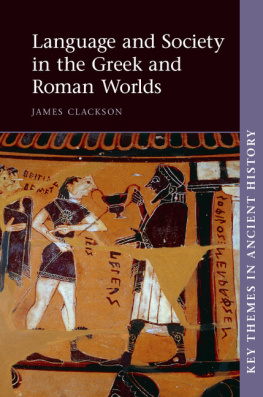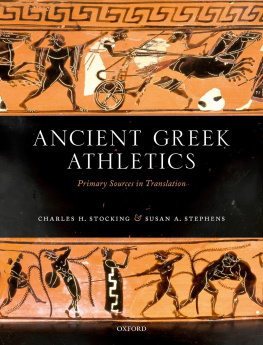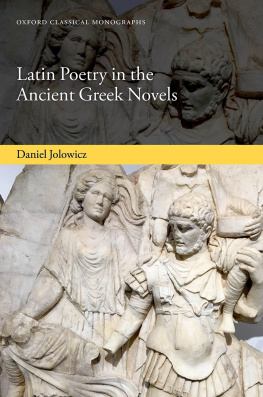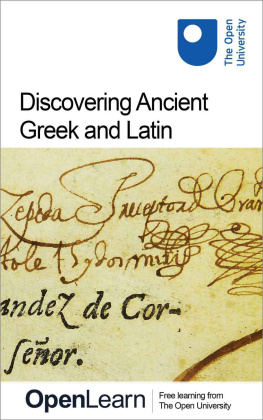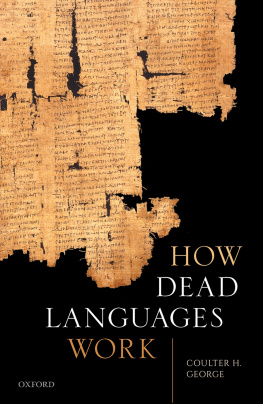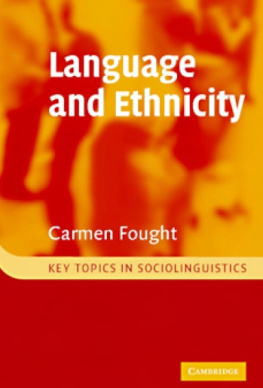Contents
Language and Society in the Greek and Roman Worlds
Texts written in Latin, Greek and other languages provide ancient historians with their primary evidence, but the role of language as a source for understanding the ancient world is often overlooked. Language played a key role in state-formation and the spread of Christianity, the construction of ethnicity, and negotiating positions of social status and group membership. Language could reinforce social norms and shed light on taboos. This book presents an accessible account of ways in which linguistic evidence can illuminate topics such as imperialism, ethnicity, social mobility, religion, gender and sexuality in the ancient world, without assuming the reader has any knowledge of Greek or Latin, or of linguistic jargon. It describes the rise of Greek and Latin at the expense of other languages spoken around the Mediterranean and details the social meanings of different styles, and the attitudes of ancient speakers towards linguistic differences.
James Clackson is a recognized world authority on the Indo-European language family. His research has focused on tracking the history and relationships of the ancient languages of the Mediterranean basin and Europe, ranging from Armenian to Volscian. His previous books include The Linguistic Relationship between Armenian and Greek (1994), Indo-European Linguistics (). He is also editor of the worlds oldest journal in continuous publication devoted to languages and linguistics, the Transactions of the Philological Society .
Key Themes in Ancient History
Editors
P. A. Cartledge
Clare College, Cambridge
P. D. A. Garnsey
Jesus College, Cambridge
Key Themes in Ancient History aims to provide readable, informed and original studies of various basic topics, designed in the first instance for students and teachers of Classics and Ancient History, but also for those engaged in related disciplines. Each volume is devoted to a general theme in Greek, Roman or, where appropriate, Graeco-Roman history, or to some salient aspect or aspects of it. Besides indicating the state of current research in the relevant area, authors seek to show how the theme is significant for our own as well as ancient culture and society. By providing books for courses that are oriented around themes it is hoped to encourage and stimulate promising new developments in teaching and research in ancient history.
For list of books in the series see
Language and Society in the Greek and Roman Worlds
James Clackson


University Printing House, Cambridge CB2 8BS, United Kingdom
Cambridge University Press is part of the University of Cambridge.
It furthers the Universitys mission by disseminating knowledge in the pursuit of education, learning and research at the highest international levels of excellence.
www.cambridge.org
Information on this title: www.cambridge.org/9780521140669
James Clackson 2015
This publication is in copyright. Subject to statutory exception and to the provisions of relevant collective licensing agreements, no reproduction of any part may take place without the written permission of Cambridge University Press.
First published 2015
Printed in the United Kingdom by TJ International Ltd. Padstow Cornwall
A catalogue record for this publication is available from the British Library
ISBN 978-0-521-19235-4 Hardback
ISBN 978-0-521-14066-9 Paperback
Cambridge University Press has no responsibility for the persistence or accuracy of URLs for external or third-party internet websites referred to in this publication, and does not guarantee that any content on such websites is, or will remain, accurate or appropriate.
Contents
Maps
The maps can be found in the colour plate section.
Figures
Every effort has been made to secure necessary permissions to reproduce copyright material in this work, though in some cases it has proved impossible to contact copyright holders. If any omissions are brought to our notice, we will be happy to include appropriate acknowledgements in any subsequent edition.
Tables
Acknowledgements
I have relied on the help, advice and support of a large number of people to write this short book. My first debt of thanks is owed to Paul Cartledge and Peter Garnsey for suggesting that language would make a good topic for the Key Themes in Ancient History series, and for their kind encouragement, helpful suggestions and careful scrutiny of my text. I am honoured that Jim Adams agreed to read through a first draft of the manuscript, and I am very grateful to him for countless suggestions for improvement and for the notification of a number of bibliographic references that I would otherwise have missed. I am also indebted to two scholars from whom I learnt a lot when they were my PhD students, and from whom I continue to learn, Coulter George and Alex Mullen, who both read through drafts and, among many other things, ensured that my Phoenician and my Gaulish were better than they had been. I must record my deepest gratitude to two other readers of the manuscript who tried valiantly to ensure that the text might be understood by an undergraduate classicist or even an educated layperson: Calum Walker, now working in the film industry, and Vronique Mottier, sociologist extraordinaire . All of my readers saved me from numerous howlers, but undoubtedly others remain they are not to blame; I am.
A number of other people were kind enough to answer queries, read shorter sections, suggest bibliography or send unpublished work. I owe particular and personal thanks to each of the following: Robert Crellin, Geoffrey Horrocks, Patrick James, Amanda Kelly, John Lee, Katherine McDonald, Rachel Mairs, David Oosterhuis, George Owers, Stephanie Posner, Janet Soskice, Pippa Steele, Rupert Thompson, Olga Tribulato, Bert Vaux, Sheila Watts, Peter Williams, Martin Worthington, Nicholas Zair.
This book is dedicated with much love to Vronique Mottier.
Abbreviations
CEG
Peter Allan Hansen, Carmina epigraphica graeca. Berlin 19831989
CII/P
Hannah M. Cotton, Eran Lupu, Maria Heimbach and Naomi Schneider, Corpus inscriptionum Iudaeae/Palaestinae. A Multi-lingual Corpus of the Inscriptions from Alexander to Muhammad. Vol. I. Jerusalem . Berlin 12
CIL
Corpus Inscriptionum Latinarum . 1881
DB
Darius Is rock inscription at Bisitun
Epist.
Epistula
ET
Helmut Rix et al., Etruskische Texte: editio minor . Tbingen
ICS
Olivier Masson, Les inscriptions chypriotes syllabiques: recueil critique et comment . Paris 1961
IG
Inscriptiones Graecae . 1873
ILS
Hermann Dessau, Inscriptiones Latinae Selectae . Berlin 18921916
KAI
H. Donner and W. Rllig, Kanaanische und aramische Inschriften. Wiesbaden 2002
LfrgE
Bruno Snell, Lexikon des fruhgriechischen Epos . Gottingen 19552010
LGPN
Peter Fraser and Elaine Matthews, Lexicon of Greek Personal Names . Oxford 1987
LSAG
L. H. Jeffery, The Local Scripts of Archaic Greece: A Study of the Origin of the Greek Alphabet and its Development from the Eighth to the Fifth Centuries B.C. Revised edition by A. W. Johnston. Oxford 1990

